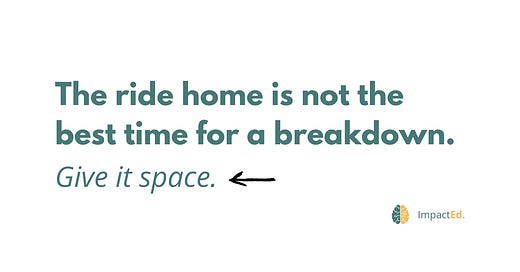“Stop Yelling My Name!”
What athletes wish their parents knew on game day (and what the research says, too)
There’s this video floating around, maybe you’ve seen it…
Athletes sharing the hilarious (and slightly painful) truth about what their parents yell during games:
“SHOOT IT!”
“PASS!”
“RUN!!”
“Get your hands up!”
“YOU GOTTA WANT IT!”
Their reactions?
Cringe. Eye-roll. Embarrassment. Total distraction.
One girl said it best: “I’m trying to play. I’ve got a coach. I don’t need five more in the stands.”
It’s funny. It’s real. And it’s worth talking about.
Because as parents, we all want the best for our kid.
We all want to help. But sometimes our well-meaning words create more issues instead of actual support.
What the Science Says
Research in the world of sport psychology consistently shows this:
Too much external input during competition increases anxiety, lowers confidence, and hurts performance.
In fact, a 2021 study found that athletes who perceived their parents as overly controlling or reactive on game day experienced higher levels of performance anxiety and decreased motivation over time.
Translation?
Even when it comes from a place of love…
Too much sideline chatter can mess with your kid’s head.
So What Do Athletes Really Want?
Based on interviews, surveys, and actual responses from student-athletes, here’s what they wish parents would do on game day:
Cheer, don’t coach
Encourage effort, not outcomes
Let the coach do his/her job… coach
Be present, not intense
Give space post-game (unless invited in)
It’s not that they don’t want you there. They just want to be able to compete without added pressure or a sideline echo chamber.
Shifts In Your Approach Worth Considering
Here’s what actually supports your athlete long term:
Before the Game:
“I love watching you play.”
“Have fun out there today.”
“Trust all your hard work.”
During the Game:
Smile. Clap. Cheer for everybody, not just your own kid.
Zip it on the technical stuff—trust their coach and training.
After the Game:
Ask: “Want to talk about the game?” (Then respect their answer.)
If they say yes:
Listen first.
Reflect, don’t redirect: “What felt good today? What was challenging?”
Encourage ownership: “What’s something you’d like to work on before your next game?”
If they say no:
Don’t take it personally.
Say: “Sounds good.”
Then move on. Talk about food. Music. Life. Or simply turn on some music. Let them come back to the game when they're ready.
It’s not easy to sit quietly when you see something on the field, on stage, or on the court.
But here’s the truth (backed by research):
Connection fuels performance. Control disrupts it.
Presence builds confidence. Intensity breeds anxiety.
Trust creates space to grow. Pressure shuts it down.
Your voice matters—and how you use is a contributing factor to your childs development.
This is how we Fuel the Future. One moment, one conversation, one person at a time.
Supporting you every step of the way,
— The team at ImpactEd.




